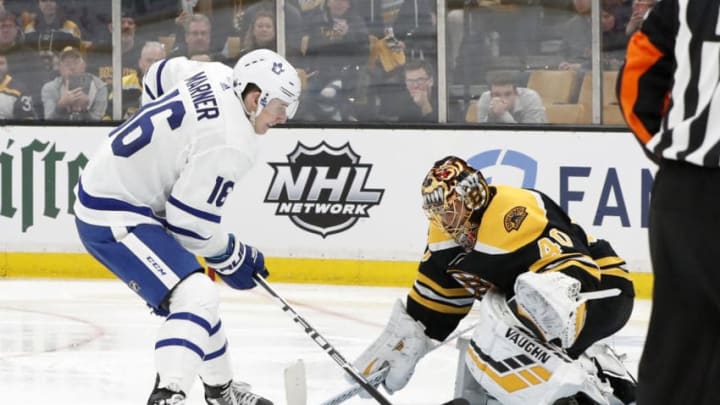The Toronto Maple Leafs have made some historically bad trades, but this one may sting the most
For almost two decades, the Toronto Maple Leafs were missing a lot of pieces to their roster that could contribute to constructing a Stanley Cup contending team, but one major piece they were lacking for most of that time was a solid starting goaltender.
Luckily that is not a problem anymore, as the newly-named All-Star Frederik Andersen has answered the prayers of Leafs fans, and has played a huge part in building this team into becoming a competitive one for a long time.
I think I speak for all Maple Leafs fans when i say that we would love to sweep this deal under the rug along with the many other nightmares that the Boston Bruins have haunted us with. Fortunately for the Leafs, Andersen has been able to save the Leafs’ long stretch of goaltending issues, but this is definitely one of the worst trades the NHL has ever seen.
The Deal
On June 26th 2006, the Toronto Maple Leafs traded their 2005 first round draft pick, Tuukka Rask, to the Boston Bruins, for Andrew Raycroft, in what would develop to be one of the worst deals in franchise history.
Coming into the draft, Tuukka Rask was ranked second among goaltender prospects behind someone named Carey Price, and Leafs General Manager John Ferguson felt he had to make a move to decide who they were going to build their goaltending future around; Justin Pogge? Or Tuukka Rask?
Justin Pogge was drafted just one year earlier than Tuukka Rask, and was coming off of a career year with the Calgary Hitmen where he posted a .926 save percentage along with a gold medal win at the World Juniors in 2006 when the deal was made. This ultimately put a lot of pressure on the young goaltender, as Ferguson clearly made his decision to build their future goaltending core around Pogge.
Andrew Raycroft, the former 2004 Calder Trophy winner, was coming off of a season with the Boston Bruins where he posted career-low numbers in every measurable category before being traded. Despite being on a significant statistical decline in the past two seasons, for some reason, and somehow not surprising, he was very attractive to the Toronto Maple Leafs.
To make matters worse, some reports that were made several years after the trade went down suggested that the Bruins were planning on releasing Andrew Raycroft in the offseason, which could have prevented this detrimental transaction from ever happening.
Worst Trade in Franchise History?
After electing to keep Justin Pogge over Tuukka Rask, Pogge’s career as a goaltender quickly went downhill.
Pogge played three seasons with the Toronto Marlies before getting called up as a 22-year-old, and would play just seven games in the 2008-2009 NHL season before being traded to Anaheim in exchange for a sixth round draft pick.
Those would be Pogge’s only games played in the NHL, as he bounced around 12 different hockey clubs throughout seven different leagues including the KHL, ECHL and SHL.
As for Andrew Raycroft, he actually put up respectable numbers in his first year with the Maple Leafs despite playing an overwhelming 72 games.
Raycroft’s 37 wins tied Ed Belfour’s franchise record for most in a single season, and the Leafs just missed out on a playoff appearance. Unfortunately, Raycroft would play for three more teams and record just 31 wins in his last four years as an NHL goalie before retiring at 33 in the SHL.
Since being traded to the Bruins, Tuukka Rask has not only terrorized Leafs nation, but has become one of the most dominant, and most most consistent goaltenders in the NHL.
In his 522 NHL contests since being traded from the Toronto Maple Leafs, Rask has won 282 of those games and put together an unbelievable .921 save percentage with a 2.82 goals against average, and even won the Vezina Trophy in the 2013-14 season.
If Leafs fans aren’t already fuming by reading this, his postseason numbers should do the trick. Rask is ranked third among active goaltenders in playoff wins, and 19th all-time with a 50-39 record, many coming against the Leafs, and was instrumental in the Bruins’ 2011 Stanley Cup win.
This season, Tuukka Rask officially became the wins leader among all goaltenders who have been drafted by the Toronto Maple Leafs, just to put the cherry on top of what has developed into one of the worst one-for-one deals in the league’s history,
While I typically do not like to let past moves made by NHL teams define who they are today, this trade has quite seemingly been the Toronto Maple Leafs worst move.
Not only has this directly affected their playoff hopes as they now have to play against a goalie who could have been between their own net, Tuukka Rask has done the one thing Leafs fans have been begging for for over 50 years; win a Stanley Cup.
